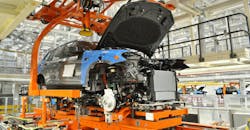BMW Says It's Committed to US Plant, Sees Trade Wars Temporary
BMW AG, among the worst-hit carmakers from the U.S. trade war with China, said the tensions will play a secondary role in decisions on where it’s making cars.
The current spat, set to cost some 300 million euros (US$340 million) this year from higher tariffs, is probably temporary, BMW’s CFO Nicolas Peter said in a panel discussion in Paris. The company follows demand expectations in choosing where to locate production, he said.
“I am optimistic and I think eventually men and women in charge will realize” the trade restrictions “aren’t the best for citizens,” Peter said at the event, which was focused on Franco-German relations. “It is not like: ‘We invest here because of tariff issues.’ It is mostly about whether the market is growing.”
The world’s second-biggest luxury carmaker ships popular sport utility vehicles to China from its plant in the U.S., which have attracted a punitive 40% tariff since July. BMW is nearing a decision in the next few weeks on producing another model in China, Peter said this week when the company presented its quarterly results.
Peter reiterated a plan to invest $600 million at Spartanburg, S.C., the company’s largest factory, to boost output to as many as 450,000 cars annually. The company started making the X3 SUV in China this year, in addition, the several other models like the 1-, 3- and 5-Series sedans. He declined to say which model BMW is set to start making locally.
Still, other carmakers are reacting. Volvo Cars this week said it would cancel plans to export U.S.-made cars to China and vice versa, to focus on supplying the local market.
By Ania Nussbaum and Oliver Sachgau
About the Author
Bloomberg
Licensed content from Bloomberg, copyright 2016.
